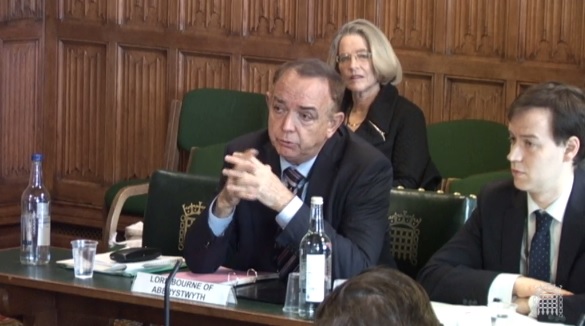Representatives from the Department of Energy and Climate Change (DECC) have teased changes to the business energy efficiency tax and reporting framework ahead of tomorrow’s Budget.
Speaking this morning at Broadway House, Lord Bourne suggested the chancellor’s announcements would include details of the government’s response to a consultation launched last year on the matter.
“We’re committed to simplifying and improving the energy efficiency landscape for business,” he said. “We want to put the right policies in place to support business to continue to support energy efficiency and reduce emissions.
“This is part of the energy taxation review, and I think we can expect to hear more from that in the Budget [on Wednesday].”
The consultation was launched following criticisms of the current framework, which the parliamentary under-secretary dubbed “complex” and “administratively burdensome” for larger companies.
Among the changes expected from the new regime is the scrapping of the Carbon Reduction Commitment (CRC), which requires firms to measure and report their electricity and gas supplies annually. These are used to calculate emissions and participants must then buy allowances for every tonne of carbon they emit.
According to Michael Jampel, deputy director of business energy use at DECC who was also in attendance at the UK Green Building Council event, large stakeholders consistently said to scrap CRC during the consultation period and asked for simplified reporting arrangements.
He claimed the department, which had worked closely with the Treasury and the Department for Business, Innovation and Skills on the consultation, had a responsibility to minimise regulations on businesses and suggested CRC would fall victim to this approach.
“Government has a top down principles as well as bottom up specific objectives. One of the top down principles of government is to try and minimise regulatory burdens on business,” Jampel added.
Instead, a new tax based on the Climate Change Levy is likely to be introduced to recoup the funds lost by scrapping CRC. This is intended to increase the profile of energy efficiency within UK businesses as according to Jampel: “Boards don’t think about how to minimise utilities, but they do think about minimising tax.”
In addition, a new reporting framework built around the Energy Savings Opportunity Scheme (ESOS) is intended to solve the issue of current overlapping schemes, with single programmes suggested for different sized firms.
Jampel explained: “In principle it would be nice to have one reporting framework for everyone for everything but in practice that’s not possible so what we’re aiming for is for each particular organisation to be hit by one. At least that’s better from the point of view of the company.”
The use of the ESOS scheme in this way has gained the approval of a number of industry organisations and businesses, not least the UKGBC. Richard Griffiths, senior policy and business development advisor for the organisation and chair of the event, said: “It’s pretty clear to me that some form of ESOS will be the centrepiece, not least because it’s a European piece of legislation which can’t really – for the time being – be got rid of. ESOS is a fantastic point around which to engage and that point of coherence is something most people think has been a good thing.”
While mandatory greenhouse gas reporting is one of these schemes, Jampel claimed big businesses had responded to the consultation with a preference to keep this requirement in place.
This will please the signatories of a letter published last week, who claimed the mandatory requirements to report on greenhouse gas emissions helped provide greater levels of board oversight and investor engagement on how to improve resource efficiency.
While the content of the Budget announcements cannot be confirmed until tomorrow, Griffiths added that there is a high level of optimism around the outcome of the business energy efficiency consultation.
“We are in a very important period of policy making for the non-domestic building sector and businesses more widely. This review of policy that’s happening at the moment is an absolutely unprecedented opportunity to come up with a policy landscape that really delivers change,” he said.
“As a general pattern, energy efficiency has stagnated a lot over the last few years and there’s a real marker in the sand now where we can really introduce a new policy regime which is simpler but hopefully more effective.”





